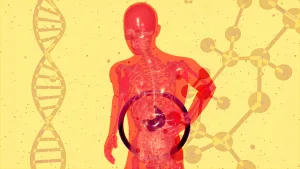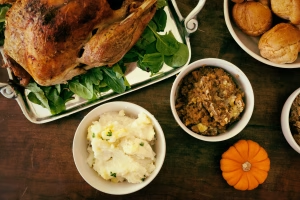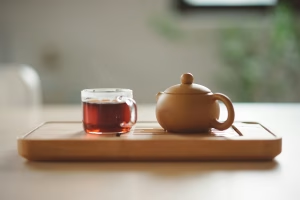Weight Loss
Point Profile for Reflux: Stomach 36

The first acupuncture point whose name I learned and was able to identify while my (first) acupuncturist was needling me was “Stomach 36”—”Zu San Li,” or “Three Leg Mile,” in reference to its alleged ability to help the patient walk three additional miles, as all transportation at the time of its discovery was obviously by foot.
“Li,” in Chinese, may also be used as a homonym for “to rectify,” in reference to the energy the point provides, either to our internal physiologies or our kneecaps it resides just inches below. (Yes, this is the point that should feel like a brief surge of shin splint down your tibia)
In modern times we are not as concerned with the need to walk a few extra miles, but the physiological intent holds relevant. Located along the anterior tibial nerve, Stomach 36 can be used to improve energy by its mechanism of increasing blood flow to the stomach, when indicated. That is, if someone is lethargic because they had five drinks the night before and only slept five hours it’s not because their organs are lacking blood. They probably need a different acu-point combination (and a nap).
Besides GERD or acid reflux, Stomach 36 is useful for treating numerous pathologies, including but not limited to diarrhea, bloating, pain of the abdomen, vomiting, belching, also conditions of the throat, chest, and lungs because of the gastrointestinal microbiome’s connection to the respiratory microbiome; finally anxiety, depression, and dizziness, because of the gut brain connection. This 2023 NCBI study concluded its ability to increase the length and mean basal pressure of the lower esophageal sphincter, of which both mechanisms reduce reflux.
According to Peter Deadman’s Manual of Acupuncture, “the great Han dynasty physician (and weren’t all great physicians from the Han??), Hua Tou, is said to have valued the use of ‘ST-36’ to treat the ‘five taxations’ and the ‘seven injuries.’”
The 5 Taxations:
- Excessive use of the eyes injures the blood (even before cell phones—imagine now!)
- Excessive lying down injures the qi (i.e. hypersomnia begets more hypersomnia)
- Excessive sitting injures the flesh (i.e. lack of exercise saps our energy)
- Excessive standing injures the bones (poor security guards)
- Excessive walking injures the sinews (any other New Yorkers remarkably inflexible?!)
Because everything starts and circulates out from the gut, if I had to choose one point to needle on every patient for the rest of my career it would be Zu San Li, Stomach 36. With appropriate metabolic fluids, we can optimize our production of nutrients, which in turn reaches all other systems of the body. Basic science.
Acid Reflux

There is a concept in Chinese medicine called “Counterflow qi,” which is in reference to when bodily gases or fluids move in the opposite direction from how they are intended. In the digestive process everything is supposed to move down. Don’t get me wrong—not too quickly—but down nonetheless. Any symptom of movement to the contrary is evidence of metabolic dysfunction.
Belching and burping are generally not perturbing to most of their sufferers, possibly apart from the occasional social embarrassment for loved ones. Nevertheless, they are indicative of some degree of weakness and/or inadequacy of vital substances failing to fully process something in the gut.
Vomiting is the extreme version of this, but the principle is the same. Somewhere in between is acid reflux, or “GERD” (gastro-espophageal reflux disease), which usually manifests as symptoms ranging from a burning sensation in the gut, chest, or throat, to a trapped feeling “below the heart,” as Classical Chinese texts would say. Patients experience this anywhere from once or a few times a week if they “eat something wrong,” to incessantly in every waking moment, understandably prompting them to somehow medicate, one way or another.
What causes this? Frankly, metabolic weakness and/or a lack of functional organ fluids, both of which can be caused by all the usual suspects: poor diet, stress, genetic predispositions, and long-term use of pharmaceutical medications.
Ironically, the drugs most commonly prescribed by conventional medicine for GERD, proton pump inhibitors, work by blocking stomach acid, thereby causing more physiological dryness, aggravating the root cause of the condition while muting its branch. This might be okay for a little while for those suffering from “excess patterns,” where the GERD truly is caused by excessive acid—but for those whose symptoms are due more to weakness, such medications will most likely yield a short leash.
Chinese medicine first attempts to distinguish the pattern—which kind of reflux are you? Then we treat accordingly, using acupuncture points and herbal formulas to calm the metabolic organs by imbuing them with more strength, mucosal fluids, and blood, and over time proper directionality of gases and fluids should follow suit.
In the meantime, it is advisable to eat foods that are easy to digest, such as sweet potatoes, steamed vegetables, eggs, fish, tofu, white rice, and/or pasta. Obviously, avoid as much as possible spicy foods and alcohol, refined sugar, dairy, and raw, uncooked foods. (Deep) breathing can be helpful for its inherent function to descend, as can massaging the stomach with both palms of your hands in 36 clockwise circles around the belly button. Empirical symptom management en route to unearthing the root cause of your unique pattern include DGL licorice pills if your pattern is one of weakness, or mint tea if you produce too much acid.
Mitigating the Side Effects Of Holiday Indulging

As all of our stomachs, intestines, livers, and pancreases quiver in fear, anticipating the overindulgences to come in the next six weeks, there are steps we can take to mitigate their onslaught of abuse, first and foremost of which is to potentially be mindful to not over-abuse—an unrealistic request for enough of us! So, what OTHER MEASURES can we take?
- Strength training: By making good use of the excess proteins and calories we can getbigger and badder musculature, and since the muscles draw upon the pancreas and stomach for tonification, strength-training provides the additional benefit of putting less burden on these organs, enabling them to better deal with the burden of parties.
- Hot tea: Booze if you must leading up to, during, and even after the meal, but bookmark your gluttony with hot tea—either Pu-Erh, which contains naturally occurring pro-biotics, or whichever flavor floats the boat. Hot tea will dilate and relax the blood vessels of your enteric nervous system (belly) which aids in digestion by breaking down the inevitable accumulations of gravy, yams, and butter.
- Breakfast! Some people make the mistake of skipping breakfast (or even lunch) the morning of Thanksgiving to “make room” for the feast to come. This is an error, as skipping breakfast actually sacrifices some of the gut’s enzymes and beneficial acids, which can make digesting the feast more difficult. Fine if you want to go small, but have something, preferably, oatmeal, millet congee, or eggs and vegetables.
- Stress management: The holidays bring at least one challenging individual into our homes, so in the words of my daughter’s favorite song: “Let it go.” Ignore if possible, just for the day, and re-address if you must the next time you speak to them.
- CHINESE HERBS! Last but not least, YOU GUESSED IT! Commonly used ingredients include hawthorn berry, which can lower cholestrol, magnolia bark if you’re the type who feels gassy and stuffiness in the chest, tangerine peel if you feel too low on appetite to get properly gluttonous, obviously ginger and licorice, the latter if you tend to GERD, also barley sprouts or medicated leaven, which are great for food stagnation.
If you’d like a brief consultation to determine what is the best gluttony-support formulation for your body type and indulgence to come, please don’t hesitate. If not for my own gout disease and general health awareness, I myself would have the inclination to over-indulge frequently, regardless of holiday season.
A brief expression of gratitude. I realize that Chinese medicine is inconvenient. It’s expensive, it tastes bad or it hurts for a moment, it takes time out of the day, etc. etc. I am grateful to all of my patients for trusting me, relying upon me, and staying the course, often through the trial-and-error process that in my opinion real medicine should look like. Happy Thanksgiving!
Yin & Yang of Stomach Pang!

Not all bellies are created equal, nor therefore, is all belly pain.
Stomach pain on the left tends to have more to do with organ function, whereas (in women) the left side might pertain more to ovarian function. Generally, belly pain that occurs above the umbilicus pertains to two of the three “yang” systems of the body, either “Shao Yang” or “Yang Ming,” either of which because of their connection to our intestines and digestive enzymes, might be accompanied by thirst for cold drinks, insomnia or agitation (not only as a result of the stomach pain), constipation, chest tightness, blurred vision, or blockage of the ears.
“Yang stomach pain,” as it were, tends to be constant—the abdomen feels firm and hard, resistant to touch. Conversely, pain that occurs below the umbilicus pertains to any one of the three “yin” systems of the body—gastrointestinal, endocrine, and/or hematological, tends to be more intermittent. The abdomen is softer, still tender to the touch, but it occurs more often in people who are prone to diarrhea and sensitive to the cold.
Thirst may still be present, though it is more likely for small sips of warm water, not big gulps of cold. That is because thirst of yin pathologies is a result of the GI tract’s lack of healthy fluids, whereas thirst of yang pathologies is from excessive inflammatory heat. If the same medicine is prescribed to both patients, one will improve and the other will exacerbate.
Yang pathologies might find relief with sour and/or bitter foods and medicinal—those whose mechanism is to drain, purge, and emolliate the abdomen.
Yin pathologies might find relief with sweeter (not by American standards) and more acrid (not by Indian standards) foods—those whose mechanism is to imbue the organs with more energy.
Another great way to distinguish diagnosis is by learning how people find relief.
If passing gas provides relief it is more likely a yang pathology, whereas if a complete bowel movement is needed it is more likely yin. If a hot compress feels good this is DEFINITELY a yin pathology, just as if ice water does it is DEFINITELY yang. A patient suffering from gastrointestinal, hormonal, or hematological weakness wouldn’t wish ice water on their worst enemy! That’s probably not true. People suffering with chronic “yin pathologies” tend to be understandably irritable, henceforth would very likely wish this on their enemies.
Then again, wouldn’t you wish acupuncture on your worst enemy, to transform them into a healthier, happier person to ultimately convert from worst enemy to best friend, or at the least, tolerable human being?
Where is your stomach pain, or that of a loved one?
What makes it better?
What makes it worse?
The answers to these questions and more can help us ascertain an accurate pattern diagnosis!
What Should We Be Drinking?
 How much water should we be drinking? Is cold water okay? Is coffee healthy or not, already? What about decaf? What about green tea? Green juices? Prune juices? Sparkling water??? Please tell me sparkling water is OK! It’s all I’ve got…
How much water should we be drinking? Is cold water okay? Is coffee healthy or not, already? What about decaf? What about green tea? Green juices? Prune juices? Sparkling water??? Please tell me sparkling water is OK! It’s all I’ve got…
Across the generations (and mediums) there have been many hydration gurus, and I suppose in this blog I’m throwing my hat into the ring, albeit really as just a hopefully qualified echo of Chinese medicine’s biological perspective.
Sparkling water is OK, but can irritate the bladder—should be kept to 1/day.
Room temp water is best, ideally half of our weight in ounces each day. Cold drinks can impair digestion, but again, once a day outside the context of a meal is no big deal, imo.
Juice is worse than people think—green juice not quite as good as people think. Green juices, without the sugars of fruit inside them, are fine, but should not replace real meals where salivary amylase is generated, we actually eat, and chew whole (green) vegetables.
One coffee/day should be fine for most people, but obviously has an excitatory and diuretic effect, so if one suffers with a lot of heat or dryness symptoms, should be minimized. These can include everything from insomnia and irritability to bloating or lack of appetite (dryness of digestive enzymes).
Green tea is preferable in people with “heat patterns,” and/or after a night of eating red meat, which can generate heat in the intestines. Again, because of its bitterness, people who tend to nausea, diarrhea, or lack of appetite should steer clear of green tea, and reach instead for…
PU-ERH TEA! Probably the healthiest thing one can drink besides clean, room temperature water, pu-erh is a black tea known for its naturally occurring pre and probiotics that enhance digestive and gut barrier function, the latter of which gets compromised by stress, medications, or alcohol. And I don’t know anyone who doesn’t check off at least one of these. Best taken hot.
I try to limit myself to 2 caffeinated beverages/day (I think no one should have more than 3), which are routinely a cup of Purity black coffee, followed by a cup of pu-erh, from either ARBOR or YUNNAN SOURCING, both of which offer organic and fair trade, high quality products. Highly recommend!

